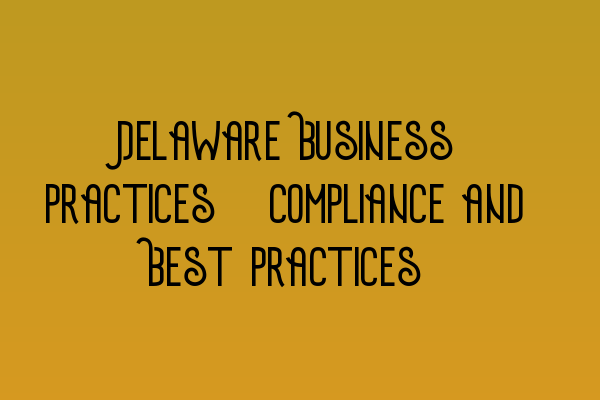Delaware Business Practices: Compliance and Best Practices
As a business owner in Delaware, it is crucial to understand and comply with the state’s business practices and regulations. Delaware has long been known as a business-friendly state with a robust legal framework that favors corporations. To ensure your business operates smoothly and efficiently, it is essential to adhere to the compliance requirements and implement best practices. In this article, we will explore some key considerations for Delaware businesses and provide valuable insights to help your business thrive.
Compliance Requirements
Delaware has specific compliance requirements that businesses must meet to maintain good standing. One crucial aspect is the annual franchise tax, which is levied on most business entities in Delaware. It is important to understand the filing deadlines and payment obligations associated with the franchise tax to avoid any penalties or legal implications. Additionally, Delaware corporations are required to hold annual meetings and maintain proper corporate records. These meetings ensure that important decisions are made collectively and in compliance with the law. It is advisable to consult with a qualified legal professional to ensure your business fulfills all compliance obligations.
Best Practices
While compliance is essential, implementing best practices can elevate your business operations and establish a strong foundation for growth. Here are some key areas to focus on:
- Corporate Governance: Delaware law provides a flexible framework for corporate governance. Establishing clear guidelines for decision-making, accountability, and transparency will ensure smooth operations and minimize conflicts. Regularly review your corporate governance structure to identify and address any gaps or inefficiencies.
- Intellectual Property Protection: Intellectual property (IP) is often a valuable asset for businesses. Take proactive steps to protect your IP rights by registering trademarks, copyrights, and patents. Develop an IP strategy that aligns with your business goals and consider consulting with an IP attorney to safeguard your intellectual property.
- Data Privacy and Cybersecurity: With the increasing reliance on technology, businesses must prioritize data privacy and cybersecurity. Implement robust security measures to protect sensitive customer information and comply with applicable privacy regulations. Regularly audit your systems, conduct employee training, and have a proper incident response plan in place.
- Contracts and Agreements: Properly drafted contracts and agreements are crucial to protect your business interests. Consult with an experienced attorney when negotiating and drafting agreements with customers, suppliers, and business partners. Clear and concise contracts will provide a solid legal basis in case of disputes or conflicts.
Conclusion
Being aware of and complying with Delaware’s business practices and regulations is vital for the success of your business. By understanding the compliance requirements and implementing best practices, you can ensure that your business operates within the bounds of the law while maximizing efficiency and growth potential. Remember to consult with qualified legal professionals to navigate the complexities of Delaware business practices confidently.
For further preparation and resources, consider exploring the following articles:
SQE 1 Practice Exam Questions
SQE 1 Practice Mocks FLK1 FLK2
SQE 2 Preparation Courses
SQE 1 Preparation Courses
SRA SQE Exam Dates

